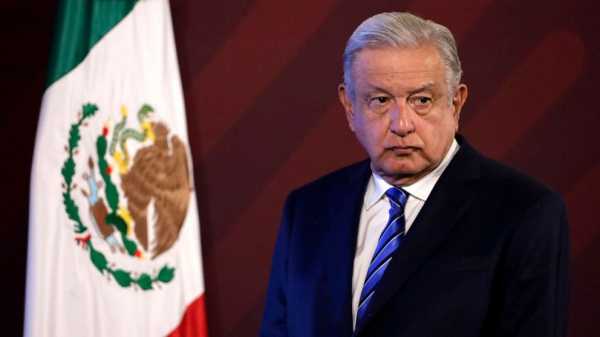MEXICO CITY — A president seemingly still preoccupied with his own false allegations of past electoral fraud uses the power of the federal government to undermine democracy.
That may sound familiar to detractors of Donald Trump in the U.S., but it's how critics are describing a different leader in North America: Mexico's Andrés Manuel López Obrador.
In the hours after Mexico's Congress approved historic changes to the country's election authority, late Wednesday, the criticism has been swift and phrased in dire terms — that Mexico's democracy itself is at stake — which López Obrador has rejected, describing the moves as needed reform for an out-of-touch organization.
But the critics are missing one key constituent: the administration of U.S. President Joe Biden.
On Wednesday, Mexico's Senate approved changes backed by López Obrador to the National Election Institute, known by its initials in Spanish as the INE. The independent authority is beloved by many Mexicans for its role in securing free and fair elections and transitioning the country away from nearly a century of one-party rule just over two decades ago.
The new legislation, which Mexico's lower house, the Chamber of Deputies, passed in December and which López Obrador is expected to soon sign into law ahead of likely legal challenges, will cut the INE's budget, hamstring its ability to penalize candidates for campaign finance violations and loosen rules on public officials campaigning while in office.
By the INE's own estimates, those budget cuts will force it to cut as much as 85% of its staff. That could mean fewer polling places or less secure electoral rolls — real impacts on the agency's ability to credibly administer federal elections, according to analysts.

Mexican President Andres Manuel Lopez Obrador is shown at the daily morning press conference at the National Palace in Mexico City. on Feb. 20, 2023.Eyepix via ZUMA Press Wire
Lorenzo Cordova, head of the INE, has criticized the legislation, which comes the year before Mexico's next presidential race.
"Mexico's electoral system was set up after decades of one-party rule with strict controls to prevent the government from meddling in elections. Now the government is rolling back some of those controls. These drastic changes to the election rules will benefit the president's party and make it harder for opposition parties to get a fair shot in the upcoming elections," Tyler Mattiace, Human Rights Watch's Mexico and Central America researcher, told ABC News.
For months, the Biden administration has said next to nothing about these proposed changes, including when Biden visited Mexico last month and embraced López Obrador and Canadian Prime Minister Justin Trudeau.
"The Department of State is closely following the latest developments in Mexico’s electoral reforms," a spokesman said in a statement. "Independent institutions free of political influence constitute a cornerstone of democracy. Non-partisan, well-resourced electoral institutions, in particular, ensure all voices are heard in fundamental democratic processes.
"We have conveyed to our Mexican counterparts our strong support for independent and well-resourced electoral institutions that strengthen democratic processes and the rule of law," the statement continued. "We will continue these discussions with the Government of Mexico and Mexican civil society while respecting Mexico’s sovereignty."
Critics charge that for an administration that says it puts democracy at the heart of its foreign policy, Biden and his top officials have pulled their punches to secure López Obrador's cooperation on issues like law enforcement and migration.
The closest the administration came to criticism was in November, after tens of thousands marched in Mexico City against the changes.
At the time, the State Department's deputy spokesperson said, "Independent institutions free of political influence are a cornerstone of democracy, and nonpartisan electoral institutions in particular ensure that all voices are heard in fundamental, democratic processes."

In this Nov. 13, 2022, file photo, thousands of people join a march from the Angel of Independence to the Monument to the Revolution to protest against Electoral Reform, in Mexico City.Future Publishing via Getty Images, FILE
Biden's top diplomat for Latin America, however, said last month that the issues were for the Mexican people to decide — their "decisions to make about the policies and the future in their country" — while his ambassador in Mexico City parroted some of López Obrador's election fraud claims in an June 2022 interview with The New York Times.
In contrast, Democratic and Republican lawmakers in the U.S. have been ringing the alarms for months. The top Republican on the Senate Foreign Relations Committee, Jim Risch, urged López Obrador in December to "immediately" reverse course, while the committee's Democratic chair, Bob Menendez, wrote to Secretary of State Antony Blinken to urge the administration to "quickly and unequivocally condemn such democratic backsliding" and "raise these concerns directly with the Mexican government."
"Cutting staff, diminishing its autonomy, and limiting its ability to punish politicians for breaking electoral laws could undermine its ability to protect the right to vote," Rep. Chuy García, D-Ill., wrote in a tweet Thursday expressing "concern" about the changes.
López Obrador's first, more sweeping effort to turn the agency's leadership over to political parties and public votes failed in December.
But the president is term-limited, leaving many asking why he's worked so hard to undermine the INE. Publicly, he has claimed that it's about cutting the agency's bloated budget and capping its "conservative" leadership.
But López Obrador's narrowly lost the 2006 presidential election and still claims that the INE stole the election from him — despite Mexico's judicial system and independent election monitors saying otherwise. While he's been in office since December 2018, his attacks on the agency have ramped up in the last year.
There will almost certainly be a legal challenge before Mexico's Supreme Court and protests are already planned in multiple cities this weekend, including in both the American and Mexican capitals.
But amid the warnings about the threat to Mexican democracy, Biden is being urged to speak out now. As Arturo Sarukhan, Mexico's former ambassador to the U.S., wrote in a tweet on Wednesday, "By 2024, policymakers in Washington may well be asking themselves, 'How—and when—did we lose Mexico?' This is how, this is when."
Sourse: abcnews.go.com






